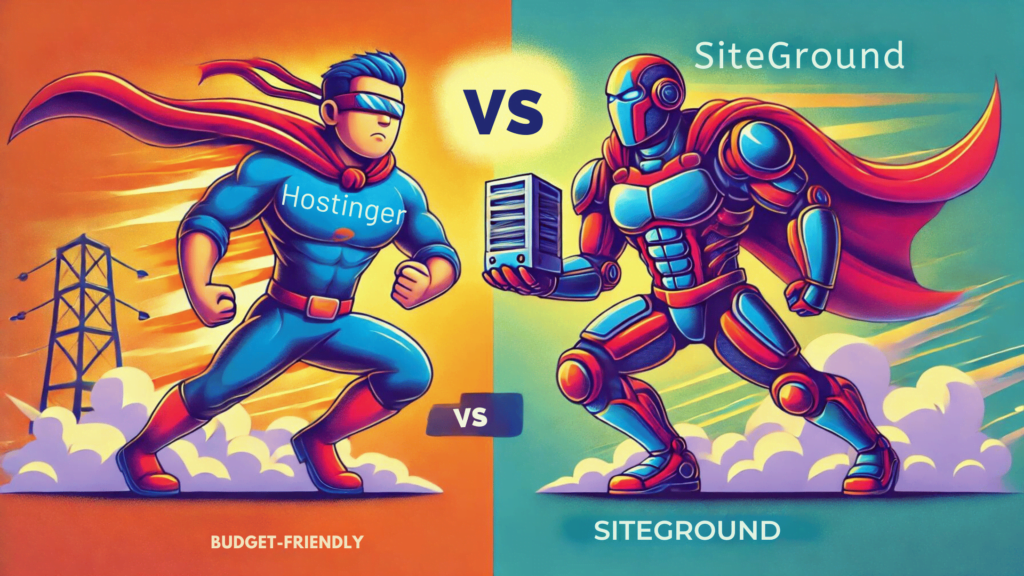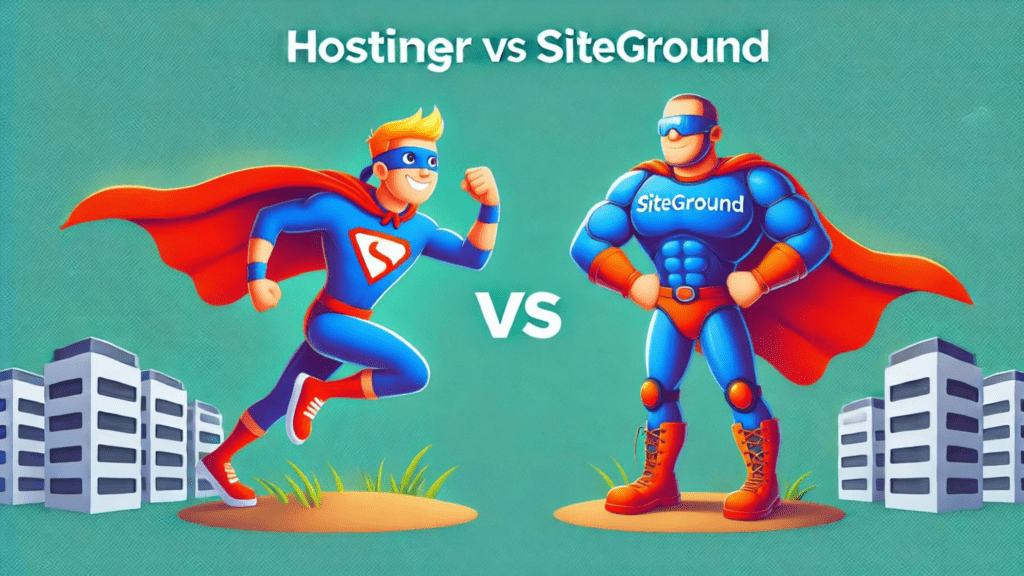Hostinger vs SiteGround: The Ultimate Showdown for Speed, Support, and Value

Let’s cut to the chase—when it comes to web hosting, there are two names you’ll constantly bump into: Hostinger and SiteGround. It’s a rivalry that’s shaken the hosting world and divided webmasters everywhere.
Table of Contents
ToggleWhether you’re setting up your first blog or managing a bustling online store, the choice between Hostinger vs SiteGround could determine if you’re flying high or sinking in a digital swamp. So, which one really deserves your investment?
Spoiler:The answer isn’t as simple as “this one’s cheaper” or “that one’s faster.” You need to dig deeper, and that’s exactly what we’re doing here.
Hostinger vs SiteGround – The Clash of Titans
Here’s the deal. Hostinger and SiteGround aren’t just names in a crowded market; they’re industry heavyweights. Hostinger prides itself on being budget-friendly without cutting corners, while SiteGround aims to deliver premium performance and top-notch customer service. But which one gives you the best bang for your buck? This showdown will slice through the marketing fluff and get straight to the core of what really matters—speed, support, and value.
Speed: The Lifeblood of Your Site
Hostinger touts itself as a speed demon on a budget. They leverage LiteSpeed servers, which are known for their high performance, especially when paired with caching plugins like LiteSpeed Cache. You’re looking at a 99.9% uptime guarantee, and, to their credit, they deliver consistently decent load times across the board.
On average, Hostinger clocks in at around 350ms in load time, which is pretty darn fast considering its lower price point.
SiteGround doesn’t just settle for fast; it pushes for the best. They use Google Cloud infrastructure—something you don’t often see in the shared hosting space. The benefit? Blazing fast speeds with built-in redundancy, meaning your site can handle sudden traffic spikes without breaking a sweat.
Add to that their SuperCacher technology, which boosts your site’s performance by three times, and you’ve got a setup that delivers near-instant load times. We’re talking sub-200ms on average.
Verdict: If speed is your ultimate concern, SiteGround edges out Hostinger. It’s the premium choice that ensures you get the absolute best. However, Hostinger is no slouch—its speed is more than sufficient for most sites, especially if you’re just starting out or running a smaller operation.
Support: When Things Go South
You don’t realize how crucial customer support is until your site crashes at 3 a.m., and every minute of downtime is costing you sales. This is where the wheat gets separated from the chaff.
Hostinger keeps things simple. They offer 24/7 support through live chat and have a vast knowledge base for the DIY crowd. Their agents are friendly enough, but here’s the kicker—response times can be hit or miss, depending on when you reach out.
During off-peak times, you’re likely to get quick, helpful responses. But when the clock’s ticking and the pressure’s on, you might find yourself waiting a bit longer than you’d like.
SiteGround doesn’t play around when it comes to customer service. They’ve consistently ranked as one of the best in the industry for their support. We’re talking instant responses via live chat, super-efficient ticketing systems, and phone support that’s genuinely helpful. Whether you’re a complete newbie or a seasoned pro, their agents will guide you through everything from minor tweaks to complex technical issues.
Verdict: SiteGround takes the crown here. Their support team is top-tier, always ready to swoop in and save the day. Hostinger’s support is decent, but it lacks the polish and reliability that SiteGround is known for.
Value for Money: What’s the Real Cost?
Now, let’s talk dollars and cents. Everyone loves a good deal, but sometimes what looks cheap upfront can end up costing you more in the long run.
Hostinger is one of the most affordable options on the market, and they’re proud of it. Their entry-level plan starts as low as $2.99/month, which is pretty much unbeatable for what you get. You get a free SSL certificate, weekly backups, a free domain (on annual plans), and access to a one-click installer for WordPress and other CMS platforms.
However, keep in mind that those prices can spike when it’s time to renew—often doubling or even tripling.
SiteGround operates in a higher price bracket. Their entry-level plan starts at $3.99/month, and that’s only for the first term. When it renews, you’re looking at closer to $14.99/month. Ouch. But here’s where the value comes in: you get features like daily backups, advanced caching, priority support, and access to their proprietary tools like SuperCacher and staging environments—features that are often considered premium add-ons elsewhere.
Verdict: Hostinger wins if you’re looking for raw affordability. It’s perfect for beginners, small businesses, or anyone working with a tight budget. However, if you’re in it for the long haul and want premium features that cater to growing sites, SiteGround is worth the investment.

Ease of Use: Navigating the Control Panels
You could have the fastest servers and the best support in the world, but if your control panel is a nightmare to use, none of it matters. You need something intuitive—an interface that doesn’t require a PhD in computer science to manage.
Hostinger uses hPanel, a custom-built control panel that’s clean, minimalist, and surprisingly powerful. It’s designed with beginners in mind, so you won’t get lost in a maze of options. Setting up your site, managing email accounts, or configuring SSL is as straightforward as it gets. Plus, they’ve optimized it to load quickly, which is a nice touch.
SiteGround sticks with the tried-and-true cPanel, but with their own twist. They’ve revamped the interface, making it more modern and user-friendly while retaining all the functionality power users expect. Their Site Tools dashboard is where you manage everything, and honestly, it’s one of the best implementations of cPanel we’ve seen.
Even if you’ve never touched cPanel before, SiteGround’s layout makes it easy to find what you need.
Verdict: Both hosts offer excellent control panels, but if simplicity is what you’re after, Hostinger’s hPanel takes the cake. SiteGround’s setup is more feature-rich, which is great if you need the extra tools, but it does come with a bit more of a learning curve.
Security: Keeping Your Site Safe
Nobody wants to wake up to find their site hacked or blacklisted. Security isn’t just an afterthought—it’s essential.
Hostinger offers solid basic security features. You get free SSL, DDoS protection, and automated backups (depending on your plan). They’ve also rolled out BitNinja on their servers for real-time protection against malware and brute force attacks. It’s nothing too fancy, but it’s effective for everyday site protection.
SiteGround, on the other hand, goes the extra mile. They include AI-powered anti-bot systems, daily backups, proactive monitoring, and free SSL on all plans. Plus, their integration with Cloudflare gives you an extra layer of DDoS protection. For those running WordPress sites, they also have a dedicated plugin, SG Security, which handles everything from brute force protection to advanced login security.
Verdict: SiteGround’s security setup is more robust and tailored for users who need advanced protection. Hostinger offers good security features for its price, but if you’re running a mission-critical site, SiteGround is the safer bet.
Advanced Features: Going Beyond the Basics
As your site grows, you’ll start needing features beyond simple hosting. Whether it’s staging environments, automated updates, or advanced caching, these features can make a world of difference.
Hostinger focuses on giving you what you need without overcomplicating things. You get caching options, access to SSH for secure file transfers, and Git integration for developers. For WordPress users, their LiteSpeed Cache plugin can drastically boost your site’s performance with minimal effort. They keep it simple and efficient, which is great if you’re not planning to dive into advanced customizations.
SiteGround is where advanced users will feel more at home. They offer staging environments for WordPress, WooCommerce optimization, automated daily backups with on-demand restores, and Git pre-installed. Their proprietary SuperCacher not only boosts site speed but also lets you choose between static and dynamic caching options.
And if you’re serious about scaling, their cloud hosting solutions are ready to accommodate your growth.
Verdict: If you need more than just basic hosting, SiteGround is the clear winner. Hostinger offers decent advanced features, but they’re more suited for users who want to keep things simple.
We’ve touched on pricing, but let’s dive deeper into what you’re really getting for your money with Hostinger and SiteGround. A lot of web hosts lure you in with enticingly low introductory prices, only to hit you with massive renewal costs. Understanding the long-term financial commitment is crucial.
Hostinger is the king of budget-friendly plans. Their Single Shared Hosting plan is as cheap as $2.99/month (sometimes even less during sales), but you only get the basics: one website, one email account, and limited resources. Their most popular plan, Premium Shared Hosting, starts at $3.99/month, offering more storage, bandwidth, and freebies like a domain and SSL. However, these prices are for long-term commitments (think 48 months). The catch? Renewal rates can jump up to $8.99/month, which is still reasonable but no longer dirt cheap.
SiteGround plays in a different league. Their StartUp plan begins at $3.99/month for the first term, but renews at a whopping $14.99/month. The GrowBig plan, which is arguably their best value, starts at $6.69/month and renews at $24.99/month. You’re paying for premium features, but those renewals can burn a hole in your wallet if you’re not prepared.
Verdict: Hostinger wins the affordability game hands down, especially for longer commitments. If you’re looking to stretch your dollar as far as it can go, Hostinger is your go-to. But if you’re prepared to invest more for premium features, SiteGround’s higher price tag is justified.

WordPress Hosting: Which Platform Dominates?
If you’re like most website owners, WordPress is your go-to content management system. So, how do Hostinger and SiteGround stack up for WordPress hosting?
Hostinger offers WordPress-optimized plans with features like one-click installation, automatic updates, and specialized caching. They’ve also developed a custom WordPress dashboard that simplifies site management. It’s streamlined and effective, making it a strong option for beginners or those with modest WordPress needs. The LiteSpeed Cache plugin is a nice touch, offering a significant boost in speed.
SiteGround is a powerhouse when it comes to WordPress hosting. They’re officially recommended by WordPress.org—a badge of honor in the hosting world. SiteGround offers features like automatic updates, staging environments, and their proprietary SuperCacher, which is tailored specifically for WordPress.
They also include advanced WordPress security features and daily backups. For those running WooCommerce stores, SiteGround provides extra optimizations to handle heavy traffic and complex product catalogs.
Verdict: If you’re running a serious WordPress site, especially one with heavy traffic or e-commerce needs, SiteGround is the clear winner. Hostinger is more than capable for smaller sites, but if you’re aiming for scale and reliability, SiteGround’s WordPress offering is top-notch.
User Experience: The Day-to-Day Grind
Let’s talk about what it’s like to actually use these platforms on a day-to-day basis. You don’t want to be pulling your hair out because your hosting dashboard is confusing or slow.
Hostinger’s hPanel is sleek, modern, and intuitive. It’s perfect for beginners or anyone who prefers a minimalist interface. The navigation is straightforward, and most features are accessible within a couple of clicks. Whether you’re setting up a new site, managing domains, or tweaking settings, hPanel keeps things user-friendly without sacrificing control.
SiteGround’s Site Tools dashboard, built on top of cPanel, is a bit more feature-rich. While the learning curve might be steeper for absolute beginners, seasoned users will appreciate the depth of control. From managing databases to optimizing performance, everything is well-organized and accessible.
Plus, SiteGround’s integration with the Google Cloud platform adds an extra layer of reliability and speed to the user experience.
Verdict: Hostinger is the winner for users who want simplicity and ease of use, while SiteGround is ideal for those who need more control and advanced features at their fingertips.
Hostinger vs SiteGround Scalability: Growing With Your Needs
Your hosting needs today might look very different a year from now. So, which provider is better equipped to scale as your business or website grows?
Hostinger offers an easy upgrade path from shared hosting to cloud hosting. Their cloud plans provide a significant performance boost, offering dedicated resources that ensure your site can handle more traffic. The pricing remains competitive even as you scale, making it a great choice if you’re planning steady growth.
SiteGround shines when it comes to scalability. Their cloud hosting is a premium solution designed for high-traffic sites, offering fully customizable plans where you can adjust CPU, RAM, and storage as needed. It’s pricier than Hostinger, but you get what you pay for—exceptional speed, reliability, and flexibility.
For growing businesses, SiteGround also offers managed solutions tailored to specific needs, ensuring you’re never stuck with a one-size-fits-all package.
Verdict: If you anticipate rapid growth and need a hosting provider that can grow with you seamlessly, SiteGround is the superior choice. Hostinger is more than capable for gradual scaling but doesn’t offer the same high-end options as SiteGround.

Eco-Friendliness: Going Green
In today’s world, sustainability matters. So, how do these hosts fare when it comes to eco-friendly practices?
Hostinger has made strides in reducing their carbon footprint by using energy-efficient servers and participating in various green initiatives. They’re committed to running their operations sustainably, which is a big plus if you’re conscious about your environmental impact.
SiteGround is also dedicated to eco-friendly hosting. They partner with Google Cloud, which matches 100% of the energy consumed with renewable energy purchases. This means that SiteGround’s operations are carbon neutral. They also invest in their own energy-efficient technologies, making them one of the greener choices in web hosting.
Hostinger vs SiteGround Verdict: Both hosts take sustainability seriously, but SiteGround’s integration with Google Cloud gives them the edge in this area.
If you need more than just basic hosting, SiteGround is the clear winner. Hostinger offers decent advanced features, but they’re more suited for users who want to keep things simple.
Choosing between Hostinger and SiteGround ultimately boils down to what you prioritize most in a hosting provider:
- Budget-Friendly: If you’re looking to get the most value out of a tight budget, Hostinger is unbeatable. It’s fast, reliable, and offers all the essentials you need to get your site up and running without breaking the bank.
- Premium Performance and Support: If you’re willing to invest a bit more for superior speed, support, and advanced features, SiteGround is the clear winner. It’s the ideal choice for growing businesses, high-traffic websites, and anyone who needs top-tier performance.
In the end, both of these hosts deliver in their own ways. It’s just a matter of aligning your choice with your specific needs and goals. Whether you’re aiming to scale your business or simply want to host a small blog, one of these options will be the perfect fit for you.













